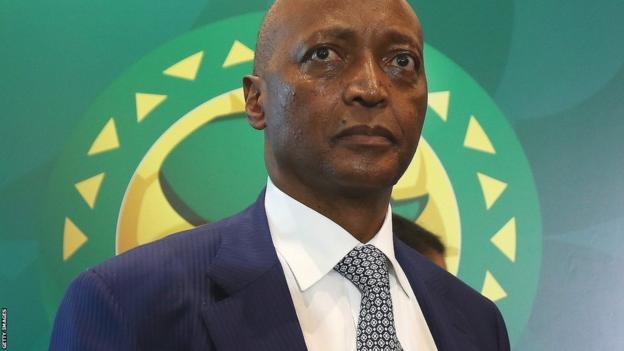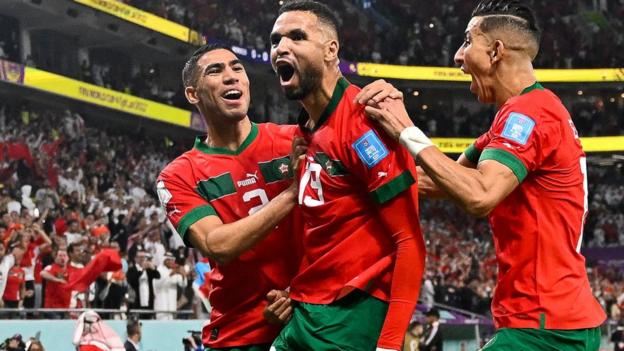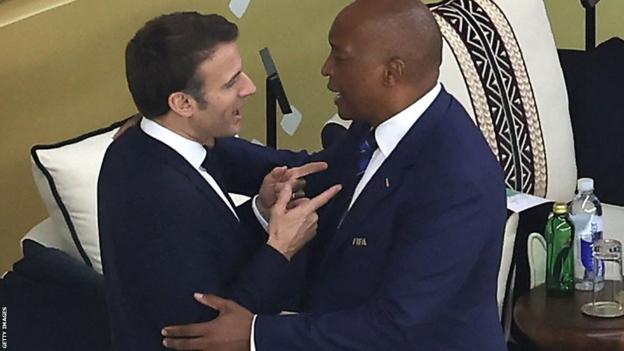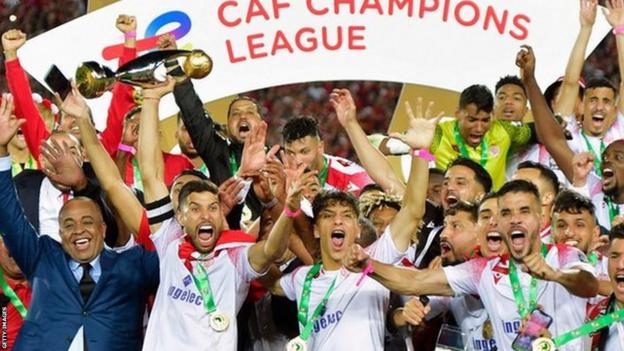
By Piers Edwards
BBC Sport Africa

An African nation will reach the World Cup final in 2026, Confederation of African Football (Caf) president Patrice Motsepe said on Wednesday as he reflected on the continent’s successful campaign in Qatar.
The South African believes Morocco’s pioneering run to the 2022 World Cup semi-finals in Qatar has laid groundwork regarding both belief and ambition ahead of the next finals.
“I’m confident that in the next World Cup, an African nation will go further,” the 60-year-old said.
“The historic achievements of Morocco have made all of us in Africa uniquely proud. The future of African football is incredibly bright.
“If you look at the talent on the continent, there are 10-15 nations in Africa now that can compete at the highest level in the world and win.”
It is a bold claim given that Morocco, fuelled by an incredible ‘home’ support given the proximity of Qatar to North Africa, are the sole side to have ever contested the semi-finals, out of 54 African visits to the tournament.
However, after Africa’s most successful World Cup ever, Motsepe also recalled that the continent has previously won the Olympics – through both Nigeria (1996) and Cameroon (2000).
In Qatar for the finals, Motsepe said he is taking inspiration from Croatia’s recent World Cup displays, with the European nation of just under four million having now reached the semi-finals in three of its six World Cups.
“Given a nation of 3.5 million people can compete against Brazil, I’ll never accept that an African nation cannot compete at the highest level,” said Motsepe as he spoke in his homeland South Africa.
“These are proud moments for football in Africa, and the main objective is an African nation to win the World Cup – we have to believe, and encourage every young boy and girl, because it’s not just the men we want to win the World Cup, but also the women.”
“We are absolutely confident that the performance at the World Cup will serve as a significant stimulus and accelerator for the very good work taking place in increasing the quality and global competitiveness of African football.”
Investment the key for Africa

Motsepe was full of praise for Faouzi Lekjaa, the head of Morocco’s football federation, and King Mohamed VI, saying the duo’s role in significantly investing in the country’s football should inspire Africa.
Yet as he freely admitted, very few of the continent’s other countries invest anywhere near the same amount.
“The quality, growth and success of football in any one of the 54 countries is not what it should be,” he said. “There are a number of countries in Africa, but sadly not many really invest.”
As he has since taking charge in March 2021, Motsepe – Africa’s ninth-richest man according to Forbes magazine, with a fortune of just under $3 billion – stressed the importance of the private sector investing in football, and Caf’s continuing investment in youth and schools football.
“Johan Cruyff told me to invest in youth football,” he said, before hinting at a possibly-short reign as Caf boss.
“Part of my job is to lay a solid foundation. You don’t judge leaders exclusively by what they do, but by the continuity, success and progress when they’re not there.”

For the first time, Caf officially acknowledged it has settled its affairs with French media company Lagardere (now SportFive) after unilaterally cancelling the biggest broadcasting deal in African football history.
The decision was taken when the African body was jointly run alongside Fifa’s Fatma Samoura, with the Secretary General effectively seconded to Caf in a bid to clean up the game.
During this six-month period, which ended when Caf’s top officials voted against any extension, the Lagardere deal was cancelled with the lure of better opportunities to come – only for the coronavirus to severely damage such hopes months later.
“We can confirm that the dispute between Caf and Lagardere has been amicably resolved to the satisfaction of both parties,” he said.
Motsepe said legal reasons prevent Caf from discussing the deal, with Lagardere having told the BBC the same thing earlier this month.
The settlement fee that Caf must pay Lagardere is $50m, split into two payments of $25m, by the end of 2024, BBC Sport Africa understands.
Both the settlement fee and Lagardere cancellation have further weakened Caf’s finances, an issue Motsepe said he would address upon taking charge in March 2021, a day when Caf revealed losses of roughly a third of its cash reserves over the previous financial year.
Motsepe said that he was asked to drop CHAN by some leading Caf officials as it “loses money” – in a further admission of how the Lagardere deal has affected things, given that this tournament was scheduled to bring in $43m as per the now ripped-up contract.

The much-trumpeted African Super League has had little official update since Motsepe said in August that the 24 teams earmarked for the tournament would receive $2.5m to take part.
Three months on, that figure has reduced to $2m – intended for clubs to buy players and afford travel – and a source close to talks says the number of teams could well reduce to just eight.
This is despite Motsepe saying “too many teams” wanted entry, although finances may well be at play again given the repeated talk of interested sponsors – “lots of money is being bandied about” – has yet to be followed up by any concrete announcements.
After an initial announcement that the Super League – which Caf has said is being run in conjunction with Fifa – would be a closed league, Motsepe said there is now likely to be a system of promotion and relegation.
“For us, the African Super League is a very important intervention and we are confident over time it will significantly increase the salaries of players in Africa,” he said.